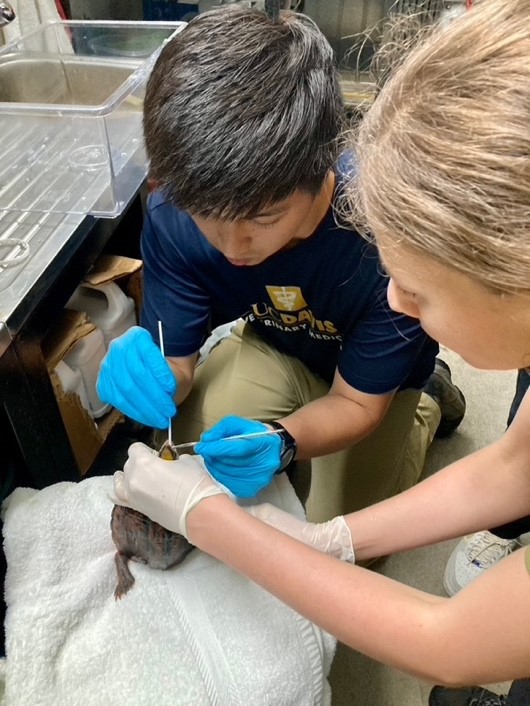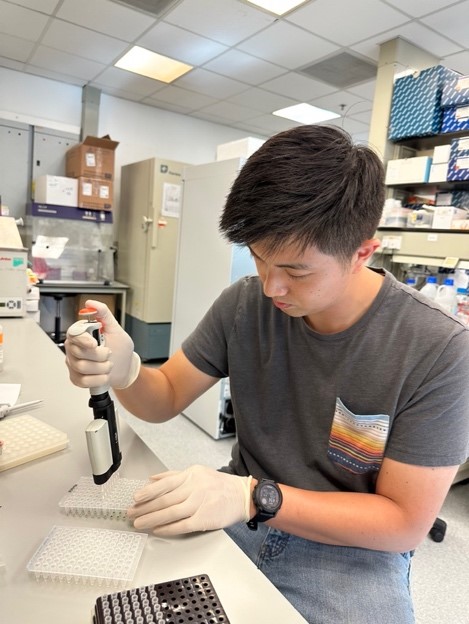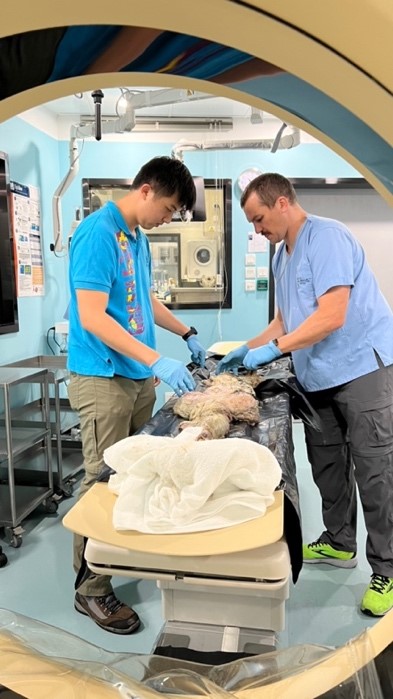Nathan Ma
This summer, I spent two months in my hometown, Hong Kong, to obtain an immersive experience in wildlife conservation and zoological medicine. I first spent four weeks with the Kadoorie Farm and Botanic Garden (KFBG) veterinary team. KFBG is a wildlife rescue and rehabilitation center in Hong Kong that provides care to injured native wildlife species and confiscated animals from illegal wildlife trades. Some animals that KFBG receives include birds, reptiles, bats, monkeys, and barking deer. I had the opportunity to work alongside Dr. Alex Grioni and Dr. Renata Snow and to learn different diagnostic and treatment approaches for wildlife species. Every day was different at KFBG; we would perform lots of bird radiographs on one day, and the next day, we would deworm 60 Mexican box turtles. I particularly enjoyed the unpredictability and variety of work the vet team does at KFBG, as it challenges my flexibility to decide, plan, or find a solution. It also shows how crucial efficient teamwork and effective communication are in high workloads or emergencies.
After KFBG, I spent another four weeks with the veterinary team at Ocean Park Hong Kong. Ocean Park is a hybrid zoo and amusement park facility that houses various zoological species, including dolphins, sea lions, giant pandas, sloths, fish, and sharks. I worked alongside the veterinary team (Drs. Paolo Martelli, Foo Khong Lee, Chris Perkins, and Jessica Li) and accompanied them on their daily rounds. One of the most memorable cases I was involved in was an anorexic electric eel. We performed various diagnostics on it, including radiographs, ultrasounds, and endoscopy, but we couldn’t figure out what was wrong. We noticed the electric eel was anemic when we compared its blood values with previous routine examinations. We then prescribed some medications to boost blood production, and eventually, it started eating again. During my last day at Ocean Park, I also had the opportunity to work on a gastroscopy of a largha seal. I learned a lot about anesthesia and surgical procedures on different zoological species. My stay at Ocean Park solidified my goal to become a zoological veterinarian, as I immensely enjoyed working with a variety of animals and with a team of experts.
During my stay in Hong Kong, I also conducted a risk assessment and pathogen surveillance on endangered freshwater turtle species in collaboration with KFBG, Ocean Park, and two local universities. I collected samples from freshwater turtles at captive breeding programs at KFBG and Ocean Park and surveyed the wild populations with Dr. Yik-Hei Sung from Lingnan University. I also worked in Dr. Brian Worthington’s diagnostics lab at the University of Hong Kong School of Public Health on analysis of the samples. The results are valuable for planning for the reintroduction of the captive populations. It was an excellent opportunity to experience wildlife conservation in both research and clinical settings. I learned a lot from this project, especially working with multiple collaborators internationally, from planning and executing the project to presenting the results. I am sincerely grateful to Global Programs for this opportunity to work in my hometown and for all the support I received from UC Davis (including my mentors Drs. Woutrina Smith and Pamela Yochem), Ocean Park, KFBG, and the two local universities (the University of Hong Kong and Lingnan University).



